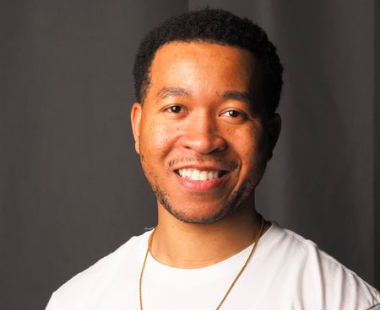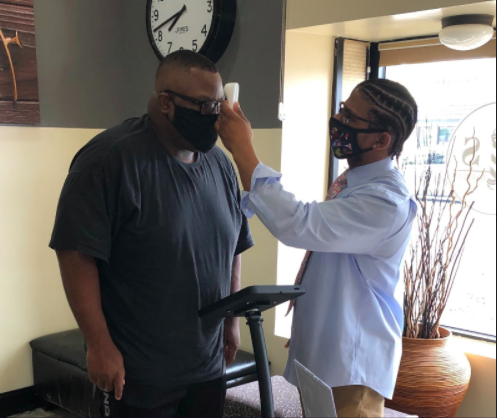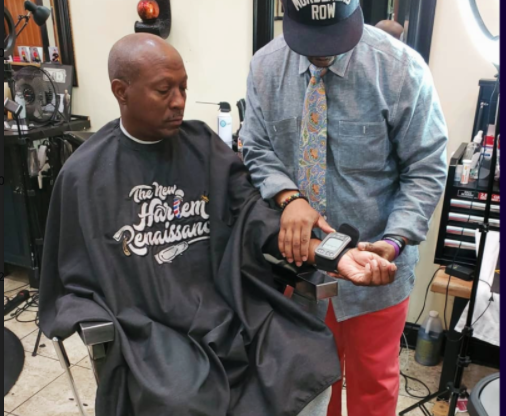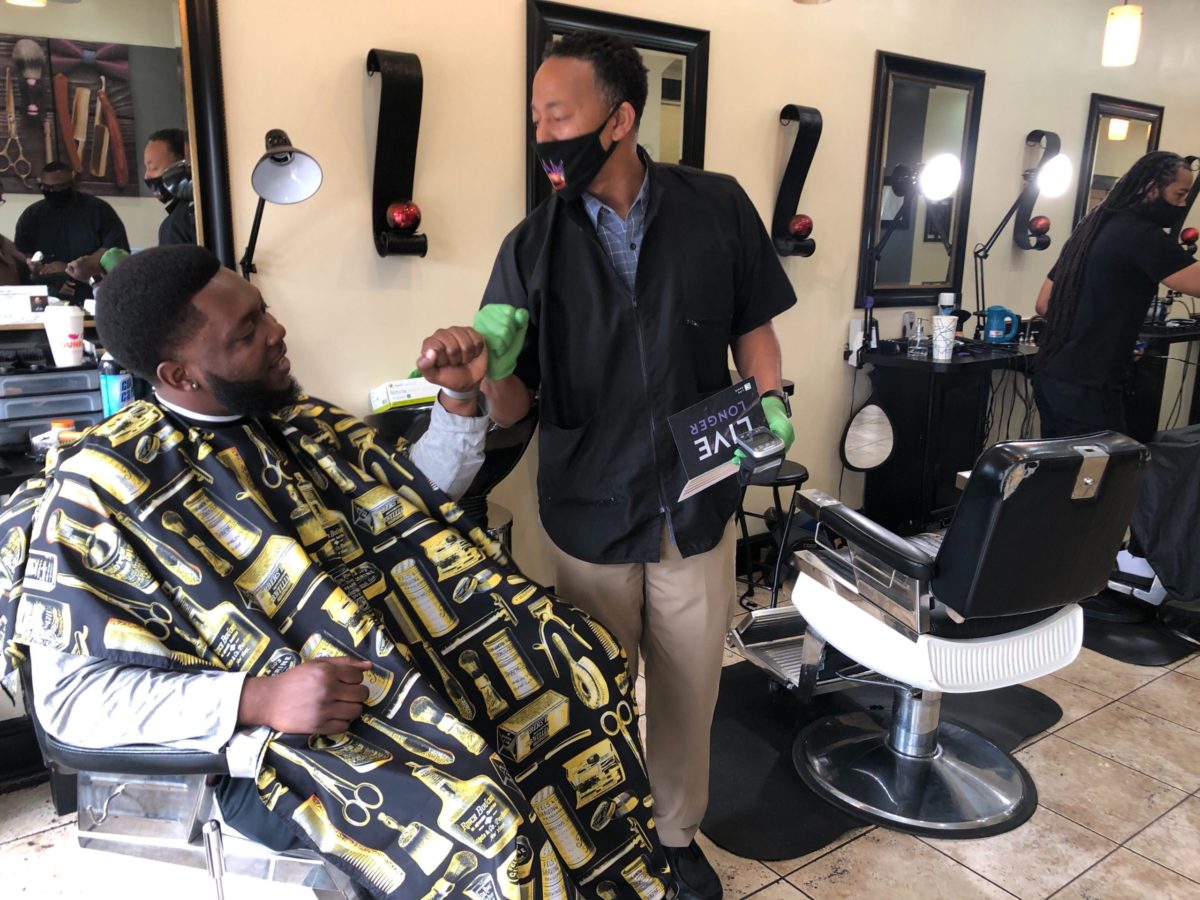Alongside scissors and clippers, Live Chair is bringing health screening tools like temperature scanners and blood pressure cuffs to barbershops in Baltimore.
Two years after moving to Baltimore, the startup is growing work with barbers to spread health awareness among Black men, who on average die five years earlier and stand at higher risk of hypertension than their white counterparts. Through a new partnership with LifeBridge Health, the company is adding a health provider to the mix and expanding to more than 20 new barbershops in the Northwest Baltimore area.
The company’s progress to date offers a look at a unique model that meets people where they are to deliver healthcare, and the links across a local entrepreneurial community that can help startups move forward.
Barbershops are a place where folks visit regularly, and they serve as a key community gathering point where you find out what’s going on. Many of the men are also uniquely close with their barbers. Seeing that Black men are less likely to visit a doctor, Live Chair CEO Andrew Suggs and his team hit on a model that added health checks to its booking and management platform, which is already used by 600 barbershops in 27 states.
With a kiosk and screening tools available at barbershops, Live Chair’s technology collects data to help catch signs of potential disease, as well as providing health recommendations and enrolling patients in specific programs. Key to the system is the barbers themselves, who agree to implement the platform, and serve as health advocates with the customers. They also receive compensation, creating an “economic win-win.”
“If the barber deems that this is a good thing to do, then that’s the meat and potatoes,” Suggs said.

Last year, the company set out initially providing training to the barbers, as well as blood pressure cuffs and scales for weight. It looked to catch the signs of heart disease and diabetes.
With the onset of COVID-19, the company moved in the pandemic to offer infrared temperature checks with text recommendations, and the kiosk has a questionnaire that can provide key info if a reading is high. That’ll be the initial focus with the new expansion. For Live Chair, it means additional support and education that they can offer to the barbershop customers, while LifeBridge will offer connections to testing and screening tools as well as PPE. The COVID-19 tools will be implemented in a first phase, while the second phase will involve the chronic disease screening that Live Chair initially developed.
Suggs called the provider partnership “the next leg in the chain” for the company, allowing Live Chair to offer connections to care, as well as understand its impact in the community. LifeBridge, too, sees it as being important for reaching people in the community and understanding how to develop effective solutions for that population.
“As they’re working, they’re actively generating interest and finding those individual barbershop clients who could benefit from services and programs in the near future and programs we might have at LifeBridge Health,” said Adam Beck, director of digital health at LifeBridge Health. It can help to explore, “How do we make it easy and seamless for those individuals to opt in, to seek out services from LifeBridge Health?”
And it’ll help Live Chair expand from its initial three barbershops where the health product was live. Going forward, the team of three full-time and five part-time employees is also looking to scale to other states.

The health product started in Maryland.
In 2016, Live Chair launched with the booking service. Seeing how most chronic diseases are preventable, Suggs said the team then set out in 2018, when they moved the company to the state, to play a role in folks reaching their full potential. It was also personal for him: Around this time, Suggs’ father began a period of multiple stints in the hospital. He had three cardiac arrests in 2019, and passed away in June of this year.
Suggs’ father frequented the barbershop, and was on his way there four days before he died, when he began experiencing complications. He saw how barbers could be advocates for their clients’ health.
“Had Live Chair been around 20, 25 years ago, would my father still be here? I think the answer is yes,” Suggs said.
The state quickly got behind the effort.
“When Live Chair Health moved to Maryland, the business benefited from capital, industry and community collaboration. Maryland connected the dots and is helping Live Chair Health innovate and drive positive social change,” said Jeffrey Mund, cofounder of venture firm MCVC Partners and Annapolis’ FounderTrac accelerator.
The move into health came as Live Chair participated in the first cohort of FounderTrac. Ryan Sears, an entrepreneurship leader in Maryland who cofounded the accelerator, ended up staying on to advise the company.
“We recognized that catalyzing Live Chair’s move to Maryland would present opportunities for the company to work with Maryland’s forward-thinking healthcare industry,” he said. “Their agreement with LifeBridge Health is a great example of how innovative organizations can partner with promising startups to affect positive change for underserved populations in Maryland, and across the country.”
Receiving $175,000 from venture firm MCVC Partners at the FounderTrac finale event, Live Chair moved into R&D for the health offering. MCVC Partners also led a round for the company that included participation from JumpStart Foundry and Baltimore native Frank Otenasek.
MCVC is interested in a cycle of “virtuous commerce,” said Beau Oliver, venture partner at the firm. So it seeks to help founders make connections and gain experience, as well as galvanize the community.
“They’re helping to address health disparities with a model that benefits all of the stakeholders,” Oliver said of Live Chair. To grow, it’s a question of, “How can we do good and make money and bring the ecosystem together to support great businesses all at the same time? This area has been great at embracing that.”

In Live Chair, these leaders found a team and a model that was passionate about not just the technology, but its implications.
“Whenever we meet with Andrew and the Live Chair team, that passion really stands out,” said Pothik Chatterjee, the executive director of innovation and research at LifeBridge Health. “Not only do they have a unique model but they bring a unique cultural and social viewpoint to their efforts.”
The startup also participated in American Heart Association’s (AHA) EmPOWERED to Serve Business Accelerator. Rhonda Ford Chatmon, AHA’s VP for multicultural markets, said the team brought a mindset of community outreach. While other health programs have worked in barbershops, she said the business model and technology to help scale can make the work sustainable.
Chatmon found Suggs especially dedicated to doing the entrepreneurial work of going into barbershops, and refining the model based on what he heard.
“The key was he is delivering to the end user what the end user needed in the way they wanted to receive it,” she said.
Soon, she connected them to LifeBridge Health, and will continue to support.
“I predict now it’s going to be a model for the country,” she said.







